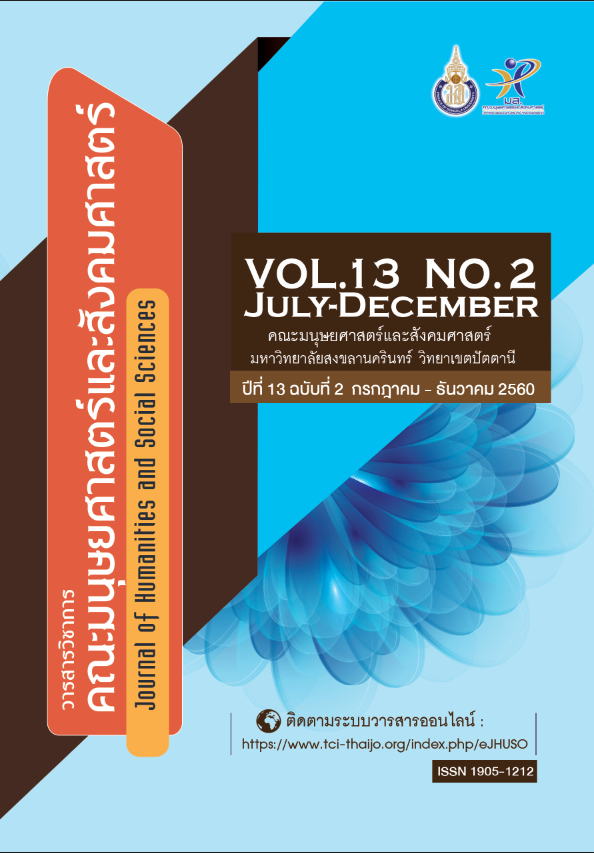การเปลี่ยนแปลงวงศัพท์ของคำทับศัพท์ภาษาอังกฤษ ในพจนานุกรมไทยตั้งแต่ปี พ.ศ.๒๔๙๓ - พ.ศ.๒๕๕๔
Keywords:
พจนานุกรมฉบับราชบัณฑิตยสถาน, คำทับศัพท์ภาษาอังกฤษ, วงศัพท์, Royal Institute Dictionary, English transliterated word, lexiconAbstract
บ ท คั ด ย่ อ
บทความวิจัยนี้มีวัตถุประสงค์เพื่อศึกษาวงศัพท์ของคำทับศัพท์ภาษาอังกฤษในพจนานุกรมฉบับราชบัณฑิตยสถาน จำนวน ๔ เล่ม ได้แก่ พจนานุกรมฉบับราชบัณฑิตยสถาน พ.ศ.๒๔๙๓ พ.ศ. ๒๕๒๕ พ.ศ.๒๕๔๒ พ.ศ.๒๕๕๔ โดยใช้แนวคิดเรื่องวงศัพท์แบ่งตามวัฒนธรรมภาษาของ โวจิลินส์ (Voegelins) เรียกว่า Hopi Domains
ผลการวิจัยพบว่า วงศัพท์ของคำทับศัพท์ภาษาอังกฤษในพจนานุกรมฉบับราชบัณฑิตยสถานที่ทำการวิเคราะห์ทั้ง ๔ เล่ม ตั้งแต่ปี พ.ศ.๒๔๙๓ - พ.ศ.๒๕๕๔ พบวงศัพท์เพิ่มขึ้นทั้ง ๔ ลักษณะ ซึ่งการเพิ่มขึ้นของวงศัพท์เหล่านี้ ปรากฏชัดเจนที่สุดในปี พ.ศ.๒๕๒๕ พบว่าเพิ่มขึ้นจำนวน ๑๓ ประเภท ได้แก่ คำที่เกี่ยวกับธรรมชาติ เพิ่มขึ้น ๗ ประเภท คำที่เกี่ยวกับมนุษย์และพฤติกรรมมนุษย์ เพิ่มขึ้น ๓ ประเภท คำที่เกี่ยวกับสติปัญญา อารมณ์ และคุณค่า เพิ่มขึ้น ๑ ประเภท คำที่เกี่ยวกับความสัมพันธ์ของบุคคล เพิ่มขึ้น ๒ ประเภท โดยคำที่เกี่ยวกับธรรมชาติ มีจำนวนคำ ที่เพิ่มขึ้นมากที่สุด ๓ อันดับแรกคือ คำที่เกี่ยวกับธาตุ คำที่เกี่ยวกับสารประกอบ และปฏิกิริยา คำที่เกี่ยวกับการวัด คำที่เกี่ยวกับมนุษย์และพฤติกรรมมนุษย์ มีจำนวนคำที่เพิ่มขึ้นมากที่สุด ๓ อันดับแรกคือ คำที่เกี่ยวกับสุขภาพและการรักษาพยาบาล คำที่เกี่ยวกับอวัยวะภายในร่างกาย คำที่เกี่ยวกับการแต่งกาย คำที่เกี่ยวกับสติปัญญา อารมณ์ และคุณค่า มีจำนวนคำที่เพิ่มขึ้นมากที่สุด ๓ อันดับแรกคือ คำที่เกี่ยวกับลัทธิ ศาสนา คำที่เกี่ยวกับการเรียนรู้ คำที่เกี่ยวกับจิตใจ อารมณ์ ความรู้สึกนึกคิด คำที่เกี่ยวกับ ความสัมพันธ์ของบุคคล พบจำนวนคำที่เพิ่มขึ้นมากที่สุด ๓ อันดับแรกคือ คำที่เกี่ยวกับอาหาร คำที่เกี่ยวกับกีฬา คำที่ เกี่ยวกับเครื่องใช้ไฟฟ้าและเครื่องมือวัด
A b s t r a c t
The objective of this study is to examine lexical increase of English transliterated words in 4 volumes (Vol. of years 1950, 1982, 1999, and 2011) of Royal Institute Dictionary. As for the framework used in this study, Voegelin’s Hopi Domains of language culture were relied upon.
The result showed that the number of English transliterated words increased in all 4 domains. The obvious rise was found in the volume of year 1982 where new 13 categories were identified as follows vocabulary of nature (7 categories), vocabulary of human being and human behavior (3 categories), and vocabulary of intelligence emotion and value (1 category), and vocabulary of interpersonal relationship (2 categories). In terms of the vocabulary of nature, the three subcategories with the biggest increase of new words were vocabulary of substance, vocabulary of compound and reaction, and vocabulary of measurement. As for the vocabulary of human being and human behavior, most of the new words were found in the sub-categories of health and treatment, internal organ, and dressing. Regarding the vocabulary of intelligence emotion and value, the sub-categories where most the new words appeared were vocabulary of sect and religion, vocabulary of learning, and vocabulary of mind emotion and feeling. Lastly, with reference to the vocabulary of interpersonal relationship, most of the new words were identified in the sub-categories of food, sport, electric device and measurement instrument.
Downloads
Published
How to Cite
Issue
Section
License
บทความนี้ได้รับการตีพิมพ์เป็นของวารสารวิชาการคณะมนุษยศาสตร์และสังคมศาสตร์ คณะมนุษยศาสตร์และสังคมศาสตร์ มหาวิทยาลัยสงขลานครินทร์ วิทยาเขตปัตตานี






